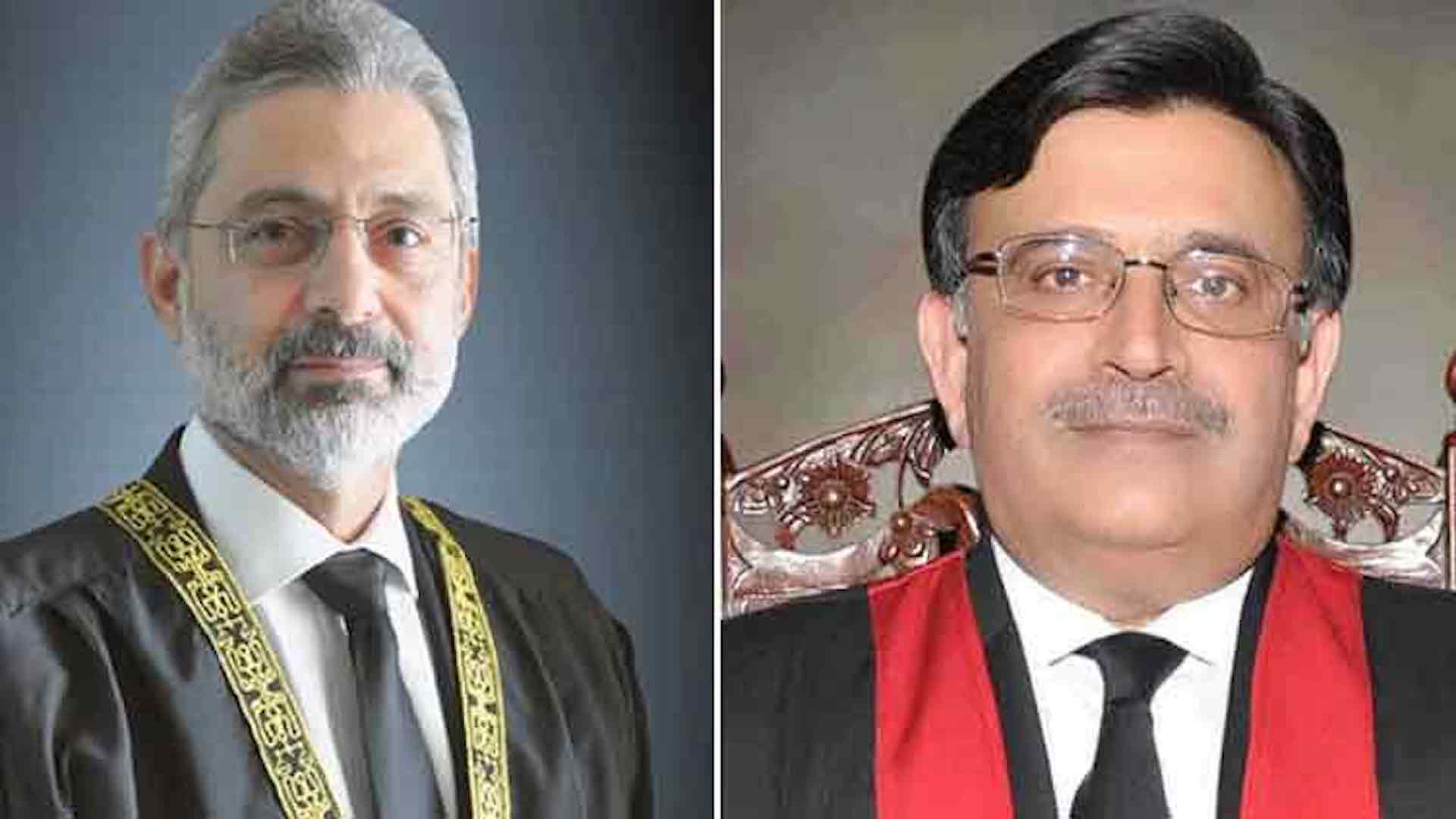According to the most basic constitutional principles that are necessary to ensure a democratic society, judges’ task is to interpret the law and uphold the rule of law. The doctrine of separation of powers says that the judiciary is supposed to refrain from encroaching upon the executive’s domain. This is why matters that are political in nature are termed ‘non-justiciable’. Judges are also supposed to refrain from exercising legislative powers – a function that falls under the domain of the parliament.
Given these fundamental democratic principles, the current situation in Pakistan makes for an interesting case study. In relation to the ‘KP & Punjab elections case’ as one may call it, the Supreme Court of Pakistan in its decision of March 1 by a majority 3-2 verdict had ordered the Election Commission to hold election for the provincial assemblies of Punjab and Khyber Pakhtunkhawa by the end of 90 days, as is required by the Constitution. However, rather than resolving matters, this judgment seemed to have further complicated matters. Following the ECP’s decision issued on March 22 to delay the Punjab Assembly election till October 8, the opposition party Pakistan Tehreek-e-Insaf (PTI) turned to the Supreme Court to direct the Election Commission to hold election at the end of the stipulated 90 days’ period, i.e. 30th April.
Unexpectedly, statements authored by Justice Jamal Khan Mandokhail and Justice Mansoor Ali Shah contested the validity of the Supreme Court’s 3-2 verdict citing a 4-3 verdict where the majority had decided that the Chief Justice of Pakistan could not exercise suo motu powers in his individual capacity without consulting other Justices of the Supreme Court.
In their concerns over the dominating influence exerted by the CJP, Justices Mandokhail and Shah scathingly remarked that the CJP had been running a ‘one man-show’, challenging his authority to decide whether a matter fell within the scope of Article 184(3) of the Constitution. The two judges also raised concern over the fact that the CJP alone had been constituting the bench in exercising the Supreme Court’s suo motu powers.
This brought to light a division of opinion among the senior most judges of the country over the proper boundaries of the CJP’s powers. Was the CJP the sole authority to exercise some of the most important powers on behalf of his fellow Supreme Court judges? Was he meant to be the ‘first among equals’? What was really meant by ‘first among equals’ in this context?
With this division among the judicial ranks having become apparent to the public, the PDM government did not waste any time in bringing the Supreme Court (Practice & Procedure) Bill 2023 to the National Assembly. It did not come as a surprise when the bill was passed with a majority in both the National Assembly and the Senate, given that the Parliament is dominated by the PDM parties following the PTI lawmakers’ hastily-decided resignations. But despite that, the timing of the bill is being questioned.
Would there be a better time for the Parliament to pass such a Bill when conflicting views among the highest judiciary are out in the open? This revolt within the judiciary means something has to be done to ensure harmony and transparency regarding judicial functions. The Supreme Court judges have been recently saying that the procedures to take up suo motu notices or to constitute the bench are ‘internal matters’ of the apex court. But when the senior most judges of the country happen to decide upon the most important constitutional matters faced by the nation in which we all tend to have a collective interest; matters that pertain to our fundamental rights, how could they be termed ‘internal matters’? These are matters of public interest and the public has every right to know about the procedure being followed by the judiciary concerning the exercise of the Supreme Court’s original jurisdiction under Article 184(3) as well as the constitution of the relevant judicial bench in individual cases of public interest.
Another very important aspect to the new Supreme Court bill – which was introduced as an amendment by MNA Mohsin Dawar – is an aggrieved party’s right to appeal against a decision made by the Supreme Court in the exercise of their original jurisdiction powers. Opponents of the ruling party will certainly see this as an opportunity being availed by the current government to reopen previously ‘closed’ matters such as former Prime Minister Nawaz Sharif’s disqualification. However, this was also suggested by Justice Mansoor Ali Shah in his dissenting note wherein he mentioned the need for an appeal process against Supreme Court’s decisions made in pursuance of the powers under Article 184(3). Therefore, despite having the possibility to benefit the current government, this provision may be equally beneficial to an opponent of the ruling coalition. The right to appeal is one of the most fundamental aspects of due process.
It is also worth noting that the former Chief Justice Asif Saeed Khosa had also pressed for reforming the Supreme Court rules governing the question of allocating judges to the bench as well as the procedures regulating the use of the court’s suo motu powers. Therefore, the new Supreme Court bill requires a committee of at least three Supreme Court judges comprising the CJP along with the two senior most judges of the same court who would collectively decide whether to exercise original jurisdiction under Article 184(3) as well as on convening the judicial bench on these matters. This shall ensure that not too much power is concentrated in the hands of just the CJP but that there is diversity of views and approaches within the workings of the Supreme Court. This would bring to an end the exact same ‘one man show’ over which Justices Mandokhail and Shah have expressed their deepest concerns.
Members of the PTI and legal commentators associated with the party have been decrying the Supreme Court bill, comparing it to Israel’s Netanyahu-led government’s attempts at curbing judicial powers. But the two situations are certainly not comparable as the bill passed by the Pakistani parliament does not seek to restrict judicial powers.
On the contrary, the Supreme Court bill actually addresses the concerns which have been expressed by members of the superior judiciary itself. Also, it is being said that the new bill is akin to a constitutional amendment, hence it can only be valid law if two-thirds majority is secured in the National Assembly and Senate. This is an erroneous claim because the bill does not seek to change the Supreme Court’s constitutional powers but it only puts forwards a coherent framework to enable the judges to exercise those same powers more effectively and transparently. It is a matter of concern to see the same judges on the panel in the most important cases. For example, rarely has one seen Justice Qazi Faez Isa being present on the bench in some of the most important constitutional cases related to sensitive political issues facing the country. His absence from such important cases has become a pattern. It is exactly this kind of apprehension on part of the reasonable observer that the Bill seeks to counteract.
The Supreme Court (Practice & Procedure) bill passed by the Pakistani parliament does not seek to restrict judicial powers. It will actually address the concerns expressed by members of the superior judiciary itself.
The differences among the senior most judiciary of the country have become even more apparent after Justice Aminuddin’s recusal from the bench in the ECP Punjab Election case on 30th March owing to his stance that the Supreme Court had by a majority verdict refused to exercise suo motu powers on the issue in its March 1 decision.
With disagreement over judicial procedures over cases which directly affect the citizens’ rights, there would be serious risk of undermining public confidence in one of our most revered institutions. The Supreme Court bill would greatly help reverse that undesirable outcome and hence, would strengthen our faith in the judiciary as well as demarcating the acceptable boundaries of institutional balance of powers between the legislature, executive and the judiciary.


